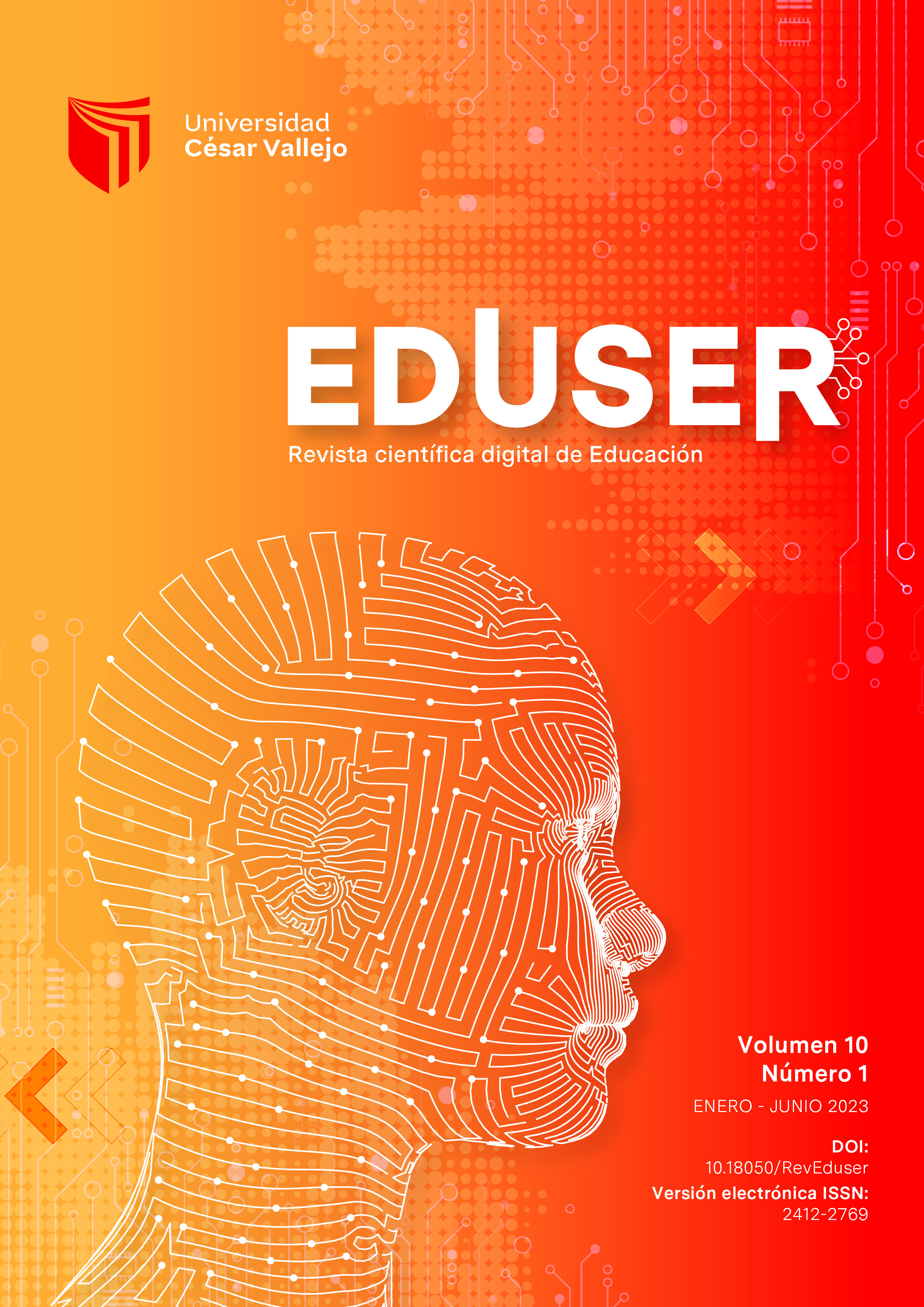Aversion to return to work due to fear of COVID19 in the education sector in Tamaulipas - Mexico
DOI:
https://doi.org/10.18050/eduser.v10n1a2Keywords:
work attitude, work sociology, quality at workAbstract
In recent years the world was affected by the COVID 19 pandemic, which forced to change the way in which the economy operated during the contingency, and with it the dynamics of work. The present research has the objective of determining the effects of the fear of COVID 19 on the return to work in the educational sector of Tamaulipa. A sample of 200 workers from the educational sector in the municipalities of Altamira, El Mante, Madero, Reynosa, Tampico, Valle Hermoso and Victoria was collected. The results showed that there is a negative relationship between fear of COVID 19 and return to work. It is concluded that fear was the main factor that generated aversion to returning to work in the educational sector of Tamaulipas, accompanied by the physical consequences of the disease and major problems such as psychological disorders. This negatively affected the return to work spaces.
References
Asociación Española de Especialistas en Medicina del Trabajo- AEEMT (2021). Síndrome Post COVID y retorno al trabajo. http://www.aeemt.com/web/2021/09/27/documento-sindrome-covid-persistente-y-retorno-al-trabajo/
Bauman, Z. (2005). Modernidad líquida. Fondo de Cultura Económica.
Builes, I., Manrique, H., y Henao, C. M. (2017). Individuación y adaptación: entre determinaciones y contingencias. Nómadas. Revista Crítica de Ciencias Sociales y Jurídicas, 51(2017.2). https://bibliotecadigital.udea.edu.co/bitstream/10495/13410/1/BuilesIsabella_2017_IndividuacionAdaptacionDeterminaciones.pdf
Chapa Puin, G. D., y Pérez Cajas, K. L. (2021). Efectos psicológicos y adaptativos post-Covid 19 en adultos de 18 a 59 años de edad. Universidad del Azuay.
Hair, J. F., Anderson, R. E., Tatham R. L., & Black, W. C. (1999). Multivariate data analysis. Upper Saddle River, NJ: Prentice-Hall International.
Hernández, J. (2020). Impacto de la COVID-19 sobre la salud mental de las personas. Medicentro (Villa Clara), 24(3), 578–594. https://medicentro.sld.cu/index.php/medicentro/article/view/3203
Herrera, P. A., Sánchez, Y., y Sánchez, M. L. (2018). El efecto mediador de la satisfacción laboral en la relación entre la percepción de oportunidades de empleos alternativos y el compromiso organizacional. Un estudio de caso en una maquila tamaulipeca. Revista De El Colegio De San Luis, 8(16), 145–169. https://doi.org/10.21696/rcsl9162018777
Jeong, H., Yim, H. W., Song, Y.-J., Ki, M., Min, J.-A., Cho, J., & Chae, J.-H. (2016). Mental health status of people isolated due to Middle East Respiratory Syndrome. Epidemiology and Health, 38, e2016048. https://doi.org/10.4178/epih.e2016048
Johns, G. (2006). The essential impact of context on organizational behavior. Academy of Management Review, 31, 386–408. https://www.jstor.org/stable/20159208
Limón, M. L. S., Félix, M. Z., & Mendoza, O. G. (2022). The impact of burnout on university workers’ intention to quit in times of COVID-19. En Research in Administrative Sciences Under COVID-19 (pp. 89–98). Emerald Publishing Limited. https://www.emerald.com/insight/content/doi/10.1108/978-1-80262-297-320221006/full/html
Limonero, J. T. (1997). Ansiedad ante la muerte. Ansiedad y estrés, 3(1), 37-46. https://www.ansiedadyestres.es/sites/default/files/rev/ucm/1997/anyes1997a5.pdf
Llorente Heras, R. (2020). Impacto del COVID-19 en el mercado de trabajo: un análisis de los colectivos vulnerables. https://repositorio.uam.es/handle/10486/691084
Lonetto, R., & Templer, D. I. (1986). Death anxiety. Hemisphere Publishing Corp.
Lu, W., Wang, H., Lin, Y., & Li, L. (2020). Psychological status of medical workforce during the COVID-19 pandemic: A cross-sectional study. Psychiatry Research, 288(112936), 112936. https://doi.org/10.1016/j.psychres.2020.112936
Mobley, W. H. (1977). Intermediate linkages in the relationship between job satisfaction and employee turnover. Journal of Applied Psychology, 62(2), 237–240. https://doi.org/10.1037/0021-9010.62.2.237
Monterrosa, Á., Dávila-Ruiz, R., Mejía-Mantilla, A., Contreras-Saldarriaga, J., Flores-Monterrosa, M.-L. M., & Chabeli. (2020). Estrés laboral, ansiedad y miedo al COVID-19 en médicos generales colombianos. MedUNAB, 195–213. https://search.bvsalud.org/global-literature-on-novel-coronavirus-2019-ncov/resource/en/covidwho-807848
Narvaez, M. (2018, noviembre 16). Rotación de personal. ¿Cuáles son las causas y cómo reducirla? QuestionPro. https://www.questionpro.com/blog/es/rotacion-de-personal/
Nunnally, J.C. (1978) Psychometric theory. 2nd Edition, McGraw-Hill, New York.
Pérez, J. (s/f). Manejo del estrés. Studocu.com. Recuperado el 23 de noviembre de 2023, de https://www.studocu.com/es-mx/document/universidad-tecmilenio/computacion-microsoft-office-e-internet/manejo-de-el-estres-ejercicio-1/5992512
Pineda, M. (2010). Causas de la rotación de personal en una empresa de seguridad privada [Causas de la rotación de personal en una empresa de seguridad privada]. https://mariomenesescpo.files.wordpress.com/2013/05/causasdelarotaciondepersonalenunaempresadeseguridadprivada.pdf
Quintana, D. (1998) La eximente de miedo insuperable. Editoriales De Derecho Reundidas.
Sánchez, L. M., Meléndez, R. E., León, C. F & Vergaray, H. J. (2022). Multidimensional scale to measure the determinants of labor abandonment derived from the pandemic in the Mexican manufacturing sector. Journal od Positive School Psichology, 6(6), 4712-4721. https://journalppw.com/index.php/jpsp/article/view/8280
Sánchez., D. C. (2015). Ausentismo laboral: una visión desde la gestión de la seguridad y la salud en el trabajo. Revista Salud Bosque, 5(1), 43–53. https://doi.org/10.18270/rsb.v5i1.182
Sandín, B., Valiente, R. M., García-Escalera, J., y Chorot, P. (2020). Impacto psicológico de la pandemia de COVID-19: Efectos negativos y positivos en población española asociados al periodo de confinamiento nacional. Revista De Psicopatología Y Psicología Clínica, 25(1), 1–22. https://doi.org/10.5944/rppc.27569
Secretaría de Salud (2020). Acuerdo por el que se establecen los lineamientos técnicos específicos para la reapertura de las actividades económicas. México: Diario Oficial de la Federación, Disponible en: https://www.dof.gob.mx/nota_detalle.php?codigo=5594138&fecha=29/05/2020&print=true
Snell, W. E., Jr, & Finney, P. D. (1988). Interpersonal strategies associated with the discussion of AIDS. Annals of Sex Research, 3(4), 425–451. https://doi.org/10.1007/bf00850443
Sujdak, E. J. (2002). An investigation of the correlation of job satisfaction, organizational commitment, perceived job opportunity, organizational communications, job search behavior, and the intent to turnover in IT professionals. Nova Southeastern University. https://core.ac.uk/download/pdf/42909514.pdf
Tomás-Sábado, J. (2016). Miedo y ansiedad ante la muerte: Aproximación conceptual, factores relacionados e instrumentos de evaluación. Herder Editorial. https://books.google.es/books?hl=es&lr=&id=bASIDwAAQBAJ&oi=fnd&pg=PT70&dq=Miedo+y+ansiedad+ante+la+muerte.+&ots=yMgQ6LSH-t&sig=gGDXH0lfQj_ArgZGMxc_BpYUGNQ#v=onepage&q=Miedo%20y%20ansiedad%20ante%20la%20muerte.&f=false
Valero Cedeño, N. J., Vélez Cuenca, M. F., Duran Mojica, Ányelo A., y Torres Portillo, M. (2020). Afrontamiento del COVID-19: estrés, miedo, ansiedad y depresión. Enfermería Investiga, 5(3), 63–70. https://doi.org/10.31243/ei.uta.v5i3.913.2020
Vicente, J. M., y Pardo, V. (2021), Síndrome post COVID y retorno al trabajo, situación de riesgo laboral. Recuperado de: https://www.researchgate.net/publication/355240945_Sindrome_Post_COVID_y_retorno_al_trabajo_situacion_de_riesgo_laboral?enrichId=rgreq-32b486fb693bbcd1ec65ed237ecdcb2d-XXX&enrichSource=Y292ZXJQYWdlOzM1NTI0MDk0NTtBUzoxMDc5MTM1OTgwMDAzMzI4QDE2MzQyOTc0NzUxNTk%3D&el=1_x_2&_esc=publicationCoverPdf
Additional Files
Published
How to Cite
Issue
Section
License
Copyright (c) 2024 Mónica Lorena Sánchez Limón, Maryed Guadalupe Jasso Sampablo, Edwin Jair Garibay Hernández, Julio César Castañon Rodríguez

This work is licensed under a Creative Commons Attribution 4.0 International License.













